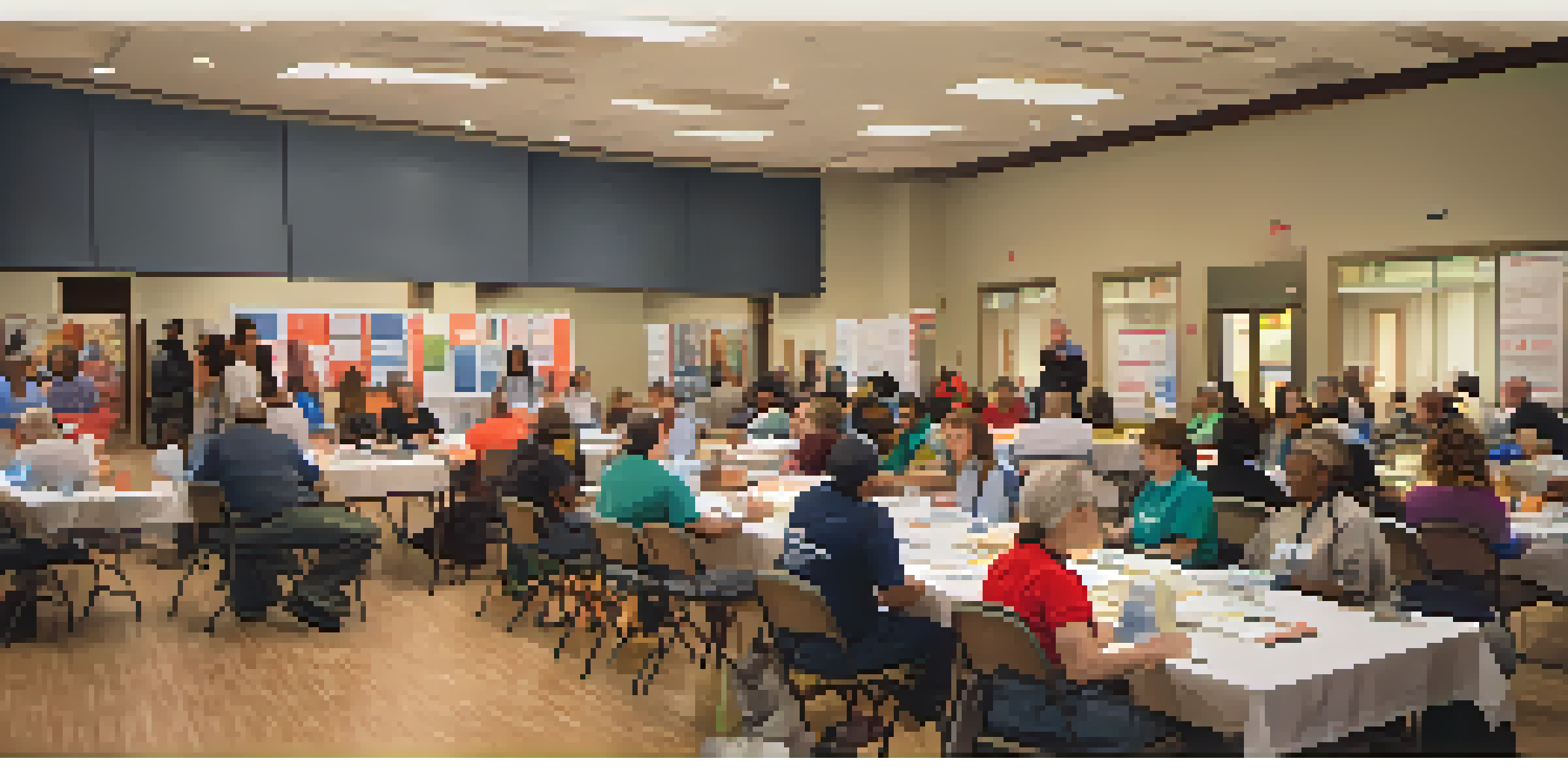Houston's Emergency Management: A Comprehensive Overview

Understanding Houston's Emergency Management Framework
Houston's emergency management framework is designed to coordinate responses during disasters. At its core, the framework involves local, state, and federal agencies working together to mitigate risks. This cooperative approach ensures that resources are effectively utilized and that residents receive timely assistance.
An ounce of prevention is worth a pound of cure.
The Houston Office of Emergency Management plays a crucial role in this framework. They develop plans, conduct training, and facilitate exercises to prepare for various emergency scenarios. By continuously updating and refining these strategies, the office aims to enhance the city’s resilience against disasters.
Additionally, community involvement is a vital aspect of Houston's emergency management. By engaging residents through awareness programs and training sessions, the city fosters a culture of preparedness that empowers individuals to take action during emergencies.
Key Challenges Facing Houston's Emergency Management
Despite its robust framework, Houston faces several challenges in emergency management. One major issue is the city's susceptibility to natural disasters, particularly hurricanes and flooding. As climate change intensifies these events, the need for effective response strategies becomes even more critical.

Another challenge is the city's rapid population growth, which can strain resources during emergencies. More residents mean a higher demand for emergency services, shelters, and medical assistance. This requires ongoing adjustments and improvements to existing emergency plans to accommodate the changing landscape.
Collaborative Emergency Response
Houston's emergency management framework relies on the cooperation of local, state, and federal agencies to effectively mitigate risks and provide timely assistance to residents.
Moreover, communication during emergencies can be a hurdle. Ensuring that all residents receive timely and accurate information is essential, yet challenging. The city is constantly exploring innovative ways to enhance communication, including utilizing social media and text alerts to reach a broader audience.
Houston's Disaster Preparedness Initiatives
Houston's disaster preparedness initiatives focus on equipping communities with the knowledge and tools they need. Programs like ‘Hurricane Preparedness Week’ encourage residents to create emergency plans and stock necessary supplies. These initiatives not only raise awareness but also promote proactive behavior among citizens.
Preparedness is the key to success and victory.
Training sessions and workshops are routinely offered to teach residents about disaster response. For example, the city provides courses on first aid, CPR, and emergency sheltering. These skills can make a significant difference during crises, empowering individuals to assist themselves and others.
Furthermore, partnerships with local organizations and businesses enhance these initiatives. Collaborations allow for resource sharing and joint training exercises, strengthening the community's overall preparedness. This collective effort fosters a spirit of resilience that is vital during emergencies.
The Role of Technology in Emergency Management
Technology plays a pivotal role in enhancing Houston's emergency management capabilities. Advanced forecasting tools and modeling systems help predict weather-related disasters, allowing for timely warnings and responses. This technological edge can be lifesaving, providing critical information when it matters most.
Moreover, the city leverages mobile applications to keep residents informed during emergencies. These apps deliver real-time updates on evacuation routes, shelter locations, and safety information. By putting vital information at their fingertips, residents can make informed decisions quickly.
Community Preparedness Initiatives
Engaging residents through training and awareness programs fosters a culture of preparedness, empowering individuals to take proactive actions during emergencies.
Another exciting development is the use of drones in disaster response. Drones can assess damage, locate victims, and deliver supplies to hard-to-reach areas. This innovative use of technology not only speeds up response times but also enhances the safety of emergency personnel.
Community Engagement in Emergency Preparedness
Community engagement is at the heart of Houston's emergency management strategy. The city fosters partnerships with local organizations to promote preparedness initiatives. This collaborative approach ensures that information reaches diverse populations, making preparedness accessible to everyone.
Neighborhood associations and community groups often organize their own training and preparedness events. These grassroots efforts empower residents to take ownership of their safety and encourage collective action during emergencies. This sense of community is crucial, as it builds trust and cooperation among residents.
Additionally, Houston's Office of Emergency Management actively seeks feedback from the community. By understanding residents' concerns and experiences, the city can refine its strategies and programs. This open dialogue further strengthens the bond between the city and its citizens, reinforcing the importance of preparedness.
Evaluating Response and Recovery Efforts
Evaluating response and recovery efforts is essential for continuous improvement in emergency management. After each disaster, Houston conducts thorough assessments to identify strengths and weaknesses. This reflective process enables the city to learn from experiences and adapt future strategies accordingly.
Feedback from first responders and the community is invaluable during this evaluation. Gathering insights from those directly involved in the response helps identify gaps in resources, training, and communication. This collaborative approach ensures that all voices are heard and considered in future planning.
Technology Enhances Safety
The use of advanced technology, including forecasting tools and mobile apps, significantly improves Houston's ability to respond to disasters and keeps residents informed.
Furthermore, the city integrates lessons learned into training programs and public awareness initiatives. By sharing these insights with residents, Houston promotes a culture of learning and resilience. This ongoing commitment to improvement strengthens the city's ability to face future challenges head-on.
Future Directions for Houston's Emergency Management
Looking ahead, Houston's emergency management is focused on addressing emerging challenges. As climate change continues to impact weather patterns, the city is prioritizing innovative solutions for disaster mitigation. This includes enhancing infrastructure, such as flood control systems, to better withstand severe weather events.
Moreover, the city is committed to investing in community resilience initiatives. By supporting neighborhood preparedness programs and fostering local leadership, Houston aims to empower residents to take proactive measures. This bottom-up approach ensures that the community's needs and concerns are prioritized.

Finally, embracing technological advancements will be key to Houston's future emergency management strategies. From artificial intelligence to smart city initiatives, leveraging technology can enhance real-time decision-making and improve overall response efforts. By staying ahead of the curve, Houston can better protect its residents during emergencies.